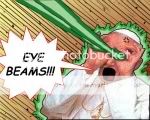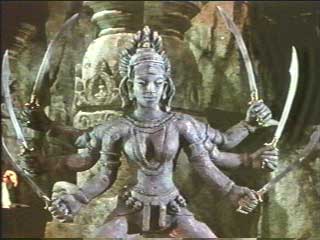Where's Buddha?
Can You Find the Fat Man on Lost? Nonono, the Other One...
The Buddhism of Lost
from Chicago Tribune
There
 are a million theories about Lost. That's one of the show's key strengths: Just about every fan of the show has his or her own idea about what's transpiring on that mysterious island, and events on Lost can be interpreted to support as many theories as viewers can come up with.
are a million theories about Lost. That's one of the show's key strengths: Just about every fan of the show has his or her own idea about what's transpiring on that mysterious island, and events on Lost can be interpreted to support as many theories as viewers can come up with.
But this season, a truly compelling explanation of the island happenings has emerged: Episodes aired in the fall revealed that the island is an experiment run by a collective known as the Dharma Initiative. Dharma is the word used to describe the collected teachings of the Buddha.
"What's going on here? Is mainstream TV really making a meaningful foray into the Buddhist world? Or is it merely rummaging through the thrift store of Buddhist terminology for the odd hat or trinket with which to play dress up?" Dean Sluyter writes in the current issue of the Buddhist magazine Tricycle. There's reason for Sluyter's wariness; he notes that the last time the word "dharma" was prominently mentioned on TV, "it turned out to mean a cute blond hippie girl married to an uptight yuppie named Greg."
There's reason for Sluyter's wariness; he notes that the last time the word "dharma" was prominently mentioned on TV, "it turned out to mean a cute blond hippie girl married to an uptight yuppie named Greg."
But Sluyter noted other Buddhism-related clues in the show: The computer that must be tended to every 108 minutes may be a reference to the 108-bead string, or mala, that some Buddhist practitioners use during meditation.
And he sees John Locke, the enigmatic character played by Terry O'Quinn, as a man with a lot of relevance to Buddhism: "Thanks to O'Quinn's gravitas, when flashbacks reveal Locke as a loser," Sluyter writes, "we accept his emergence in the forward action as the macho paramilitary survivalist of his own dreams, the warrior-sage who may well prove to be the salvation of his people. Yes, even schmendricks like us may rise to be bodhisattvas," or enlightened beings.
he sees John Locke, the enigmatic character played by Terry O'Quinn, as a man with a lot of relevance to Buddhism: "Thanks to O'Quinn's gravitas, when flashbacks reveal Locke as a loser," Sluyter writes, "we accept his emergence in the forward action as the macho paramilitary survivalist of his own dreams, the warrior-sage who may well prove to be the salvation of his people. Yes, even schmendricks like us may rise to be bodhisattvas," or enlightened beings.
An ABC publicist said that neither of the show's main day-to-day executive producers, Carlton Cuse and Damon Lindelof, is a Buddhist. Still, Sluyter notes in his piece that, aside from tossing about words such as dharma, the show does address core issues that sound familiar to anyone on the Buddhist path.
"Whenever we practice" Buddhist concepts such as meditation and mindfulness, Sluyter concludes, "we must be willing to get lost, to cast off the moorings of what we know or think we know."
from Chicago Tribune
There

 are a million theories about Lost. That's one of the show's key strengths: Just about every fan of the show has his or her own idea about what's transpiring on that mysterious island, and events on Lost can be interpreted to support as many theories as viewers can come up with.
are a million theories about Lost. That's one of the show's key strengths: Just about every fan of the show has his or her own idea about what's transpiring on that mysterious island, and events on Lost can be interpreted to support as many theories as viewers can come up with.But this season, a truly compelling explanation of the island happenings has emerged: Episodes aired in the fall revealed that the island is an experiment run by a collective known as the Dharma Initiative. Dharma is the word used to describe the collected teachings of the Buddha.
"What's going on here? Is mainstream TV really making a meaningful foray into the Buddhist world? Or is it merely rummaging through the thrift store of Buddhist terminology for the odd hat or trinket with which to play dress up?" Dean Sluyter writes in the current issue of the Buddhist magazine Tricycle.
 There's reason for Sluyter's wariness; he notes that the last time the word "dharma" was prominently mentioned on TV, "it turned out to mean a cute blond hippie girl married to an uptight yuppie named Greg."
There's reason for Sluyter's wariness; he notes that the last time the word "dharma" was prominently mentioned on TV, "it turned out to mean a cute blond hippie girl married to an uptight yuppie named Greg."But Sluyter noted other Buddhism-related clues in the show: The computer that must be tended to every 108 minutes may be a reference to the 108-bead string, or mala, that some Buddhist practitioners use during meditation.
And
 he sees John Locke, the enigmatic character played by Terry O'Quinn, as a man with a lot of relevance to Buddhism: "Thanks to O'Quinn's gravitas, when flashbacks reveal Locke as a loser," Sluyter writes, "we accept his emergence in the forward action as the macho paramilitary survivalist of his own dreams, the warrior-sage who may well prove to be the salvation of his people. Yes, even schmendricks like us may rise to be bodhisattvas," or enlightened beings.
he sees John Locke, the enigmatic character played by Terry O'Quinn, as a man with a lot of relevance to Buddhism: "Thanks to O'Quinn's gravitas, when flashbacks reveal Locke as a loser," Sluyter writes, "we accept his emergence in the forward action as the macho paramilitary survivalist of his own dreams, the warrior-sage who may well prove to be the salvation of his people. Yes, even schmendricks like us may rise to be bodhisattvas," or enlightened beings.An ABC publicist said that neither of the show's main day-to-day executive producers, Carlton Cuse and Damon Lindelof, is a Buddhist. Still, Sluyter notes in his piece that, aside from tossing about words such as dharma, the show does address core issues that sound familiar to anyone on the Buddhist path.
"Whenever we practice" Buddhist concepts such as meditation and mindfulness, Sluyter concludes, "we must be willing to get lost, to cast off the moorings of what we know or think we know."




























0 Comments:
Post a Comment
<< Home